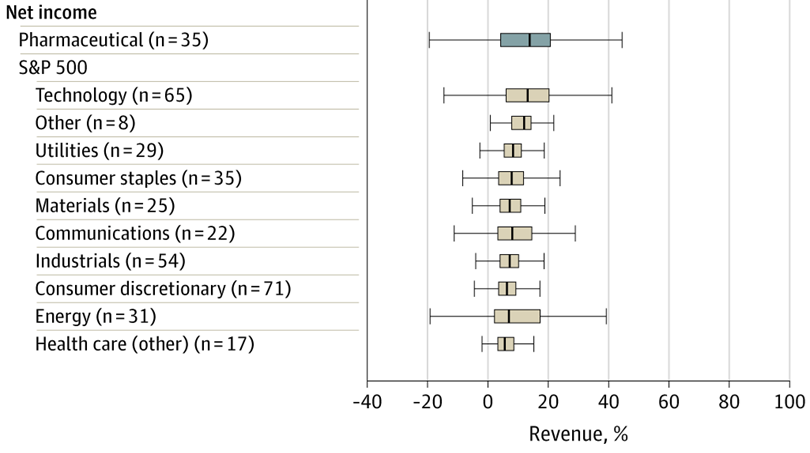In a study presented at the 25th international Aids conference in Munich on Tuesday, experts calculated that the minimum price for mass production of a generic version, based on the costs of lenacapavir’s ingredients and manufacturing, and allowing for 30% profit, was $40 a year , assuming 10 million people used it annually. In the long-term, 60 million people would probably need to take the drug preventatively to lower HIV levels significantly, they said.
Accounting for 30% profit seems reasonable to me.
Yet they’re selling it for 1000x the price.
I understand they need to recoup research costs, but…
I have no other words.
I understand they need to recoup research costs, but…
Except they don’t even need to do that, because, as is with most pharmaceuticals, the research was almost fully funded by the taxpayer.
And the 30% profit is for a generic product, so the research has already been done.
So yeah, 30% profit is of course much better than 3000%, but both are still obscene profiteering off of a lifesaving product paid for by, and then essentially withheld for ransom from, the general public.
cough I believe if 40$ means 30% profit, then the cost to produce it is 28$. With the current price of it being 42,250$, this means the profit rate is 42,250$/28$*100%=150,892%.
In words, one hundred fifty thousand percent.
It’s insane. Even if I am wrong and it’s 3000% or 30,000% profit on a product funded by tax-payer money, it’s insane and should be criminal.
By that logic, the profit on software (which is free to copy) is infinite. You need to look at revenues minus costs for the whole company, not for the specific act of manufacturing a pill.
Yeah, I wasn’t really paying that much attention, and went off of OP reply’s 30 x 1000 and then missed out a zero lol
But yeah, it only gets more despicable the more accurate the numbers are…
This is the reason I hate when people use the “recoup” argument. If anyone takes any free money to do research, then that isn’t an expense to that company. If I start my own thing, and use my own money to cure cancer, then I get to set the price to recoup my own losses. If the citizens paid for it through taxes or donations, then it should be cost + % profit. 30% is very fair.
Making profit off of medication (or any other basic survival need, for that matter, and especially if they’re publicly funded) is and always will be immoral.
This is a tough area for me. I think someone should be able to make a living researching and creating drugs. If that’s all a company does they have to make money somehow. Admittedly, I have not put much thought past that, so there may be a simple solution. Research grants and other funding can pay salaries for a time, but that’s a static income. Idk, I’m interested in how this would work without some amount of markup.
Unless profits means everything past salaries and stuff, then I do mostly agree. However I think there has to be allowance for cash on hand and further investment in infrastructure and all those other fun things needed to run and grow a business.
the problem is privatization for things that doesn’t even make sense to privatize. if the cost of discovery is too high for a private entity then why are they the ones to supply it? they aren’t actually doing anything but taking the foam from the top of what everyone else have collectively created. it’s like the privatization of energy, a natural monopoly that literally runs into negative value through surplus. or the privatization of mandatory services that cannot be sustained at cost such as nation wide mail delivery. if it doesn’t make sense the right choice is the only choice yet here we are lol.
The research cost recovery line they often yap about is bullshit itself though. The overwhelming majority of pharma research like the one involved here is subsidized through taxpayer dollars already, and they get tax incentives and write offs for failed research. If we had a sane, working government we could nationalize all life saving medications funded by public money while still allowing the inventors to enjoy some (reasonable) economic benefits from the research
Yeah and insulin can be made for like $5.
It is elsewhere in the world. The US is an exceptional case.
It’s a Br*tish news article so they actually do pay about that much for insulin, if they pay at all.
Well I’m an American with type 1 diabetes and I’m jealous. I’ve paid $600 for a box of 5 insulin pens before when I didn’t have insurance.
I lost so many friends and lovers to AIDS in the late 1980s and early 1990s. Even my mom’s first husband died of AIDS. A vaccine took way too long, and now that there is one this is what they do?!? The patents need to be voided and the vaccine distributed free of charge by amy clinic or hospital that takes federal funds.
But think of all the lost profits that rich executives could make! /s
Think of it as an investment. If you die of AIDS, you can never get high blood pressure, which means you can never buy drugs against high blood pressure!
Knowing you have HIV decreases transmission by 90%. Giving antivirals decreases transmission by 99%. Back in the early 2000 I saw a paper saying we could make HIV tests for 10 cents a person if we wanted to produce enough for every person on the planet (0.1810^9= $800 million). That was something that could have been done back then. $40 a vaccine would be a price tag of $320 billion
Even with PrEP distributed freely (with a prescription) HIV is still spreading. So unfortunately it’s not purely a money problem. A vaccine you only have to take yearly would dramatically change the landscape of transmission.
PrEP is very expensive. It is covered potentially partially by insurance.
I said distributed freely. That’s the case in a lot of places in Europe and Asia and I’ve read enough times on reddit that many Americans get it for free too.
I think many people dramatically overestimate how profitable drug companies are. The average net profit for a brand-name drug manufacturer is actually less than 30% (source). They’re about as profitable as tech companies.

That’s still quite profitable, but I suspect that if you were to limit them to 30% net profits on their most successful blockbuster drugs, their overall net profits (which have to compensate for the R&D that goes into failed drugs) might not even be positive.
Why should drug companies be profitable at all? Seems like the perfect thing to be nationalized and/or even considered a basic necessity.
Governments do have the option of simply buying the patent from the drug company (no communism necessary) but Americans have rejected socialized medicine for Americans. I don’t expect that they would want to subsidize medicine for poor Africans.
Except the majority of the cutting edge R&D is done and/or funded via the public sector.
Their R&D budget priorities are more focused on things like reformulating existing drugs to extend the patents and prevent opening the market to generic manufacturers.
So yes, cheating patent laws and heavily spending on marketing and lobbying campaigns does eat into their profit margins a little bit.
But I’m not sure how that justifies their unparalleled track record of pathologically sadistic business practices, such as the one highlighted in this article.
Do you have a graph or chart for that?
I think access to certain drugs that deeply impact the public health should be capped in the name of national security. Vaccines for AIDS, Flu, COVID-19, H1-N1, HPV, etc. and things like insulin, should be freely available to the public. Let the firms make money off of the thousands of other meds they push.
In that scenario, why would drug companies bother to develop drugs that deeply impart public health? They already prioritize drugs for smaller numbers of rich people rather than drugs for larger numbers of poor people (e.g. antibiotics). If they can’t make a large profit off of developing an AIDS vaccine, they’re going to work on something like weight-loss drugs instead.
Carrot and stick. The carrot is money for R&D plus a guaranteed purchase of their stock at a fixed and profitable markup. The stick is a regulatory hellscape and guaranteed perpetual purgatory for their other meds if they don’t play ball. Keep the gov happy, and the gov keeps you fat and rich. Drag your feet on critical care meds and risk your skinny pills not be sold in the main market for them.
A lot of that research isn’t done by these companies. Further, their marketing budget is often huge, the research budget is often lower than that.
you’ve just described every decent public health system in several countries, many of them not really rich, such as brazil.
Yep.
Is this accounting for inflated C-suite salaries/stock?








